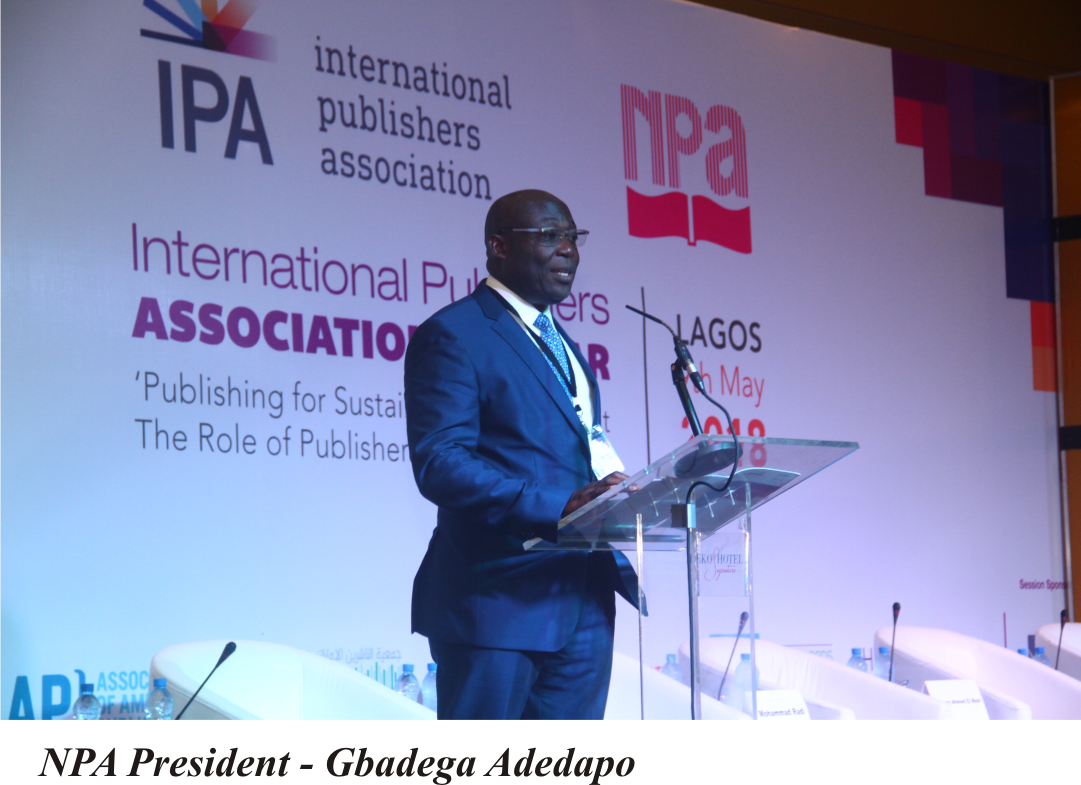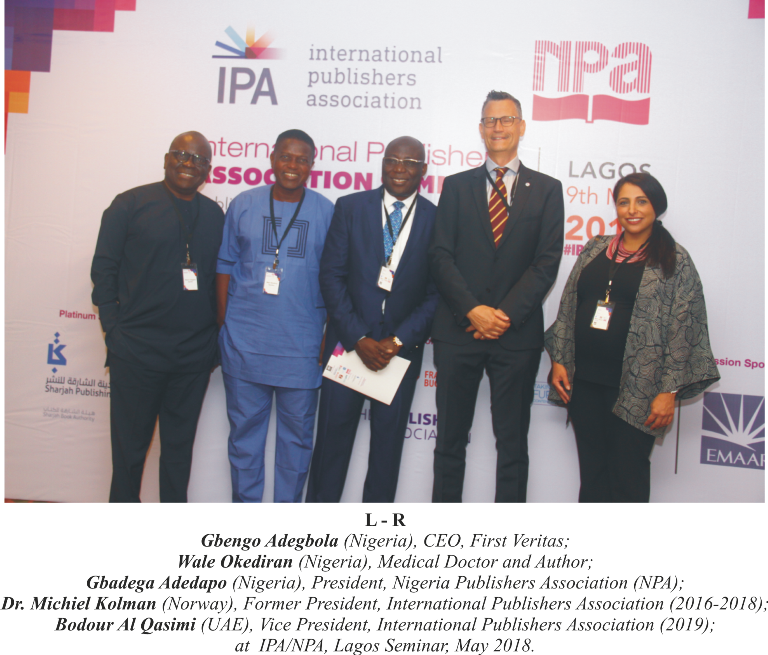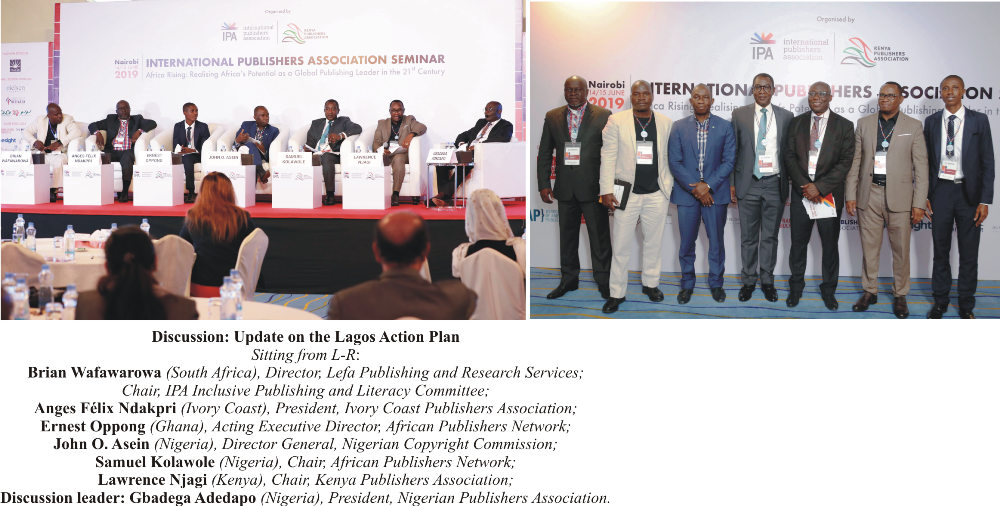


Tell us a little about your educational background and about how you ventured into publishing.
I had my first degree in Computer Science with Statistics from Ogun State University (now Olabisi Onabanjo University) and an MBA from Obafemi Awolowo University, Ile-Ife.
I also have various professional certificates which include but are not limited to Certificate in Developing Successful Publishing Strategy; Cover Concepts and Design awarded by New York University. I have a Certificate in Strategic Publishing Management: Gaining the Competitive Edge issued by The Publishing Training Centre in London.
I started my publishing business, Rasmed Publications Limited, 23 years ago with a single book published in Yoruba, a Nigerian local language. The book was titled Ise Esu (Devil’s Handiwork). My venture into the publishing business was born out of my passion for reading and noticeable gaps in the book industry. I felt there was a need to promote our local languages in order to connect with readers’ minds, to make reading interesting, to educate people and to promote literacy.

The Nigerian Publishers Association (NPA) is a professional association of publishers and the only collective voice of the publishers of Nigeria. It has been in existence since 1965. It has been a rallying point for all book, journals, and electronic publishers in the country since its inception.
The mandate of NPA is to promote and protect publishing in Nigeria by providing a conducive business environment for publishers, creating a forum through which publishers come together to deliberate on various issues affecting the publishing industry and to work out possible solutions while forming a synergy to tackle the challenges.
We make an effort to promote the reading culture and to contribute to the growth of education in Nigeria through publishing quality and content- rich books. We also strive to protect intellectual property through copyright.
 You are on the
executive committee of the International Publishers Association. Tell us a
little about the members of the committee, about the work you do and how often
you meet as a committee.
You are on the
executive committee of the International Publishers Association. Tell us a
little about the members of the committee, about the work you do and how often
you meet as a committee.The International Publishers Association is governed by the General Assembly, The Executive Committee, President, Vice President and Treasurer. It is administered by the Geneva-based secretariat. The governance of the association is based on a formal set of Statutes, and the three permanent Committees (Freedom to Publish Committee, Copyright Committee and Membership Committee).
The Executive Committee is the “board†of the Association and our responsibilities include managing the activities between the General Assemblies, which is the supreme body of the Association consisting of delegates from IPA’s Regular Members.

We had an 8-member
committee set up for the Lagos Action Plan (LAP) Committee comprising John
Asein (Director General and Chief Executive, Nigerian Copyright Commission);
Jose Borghino (Secretary-General, International Publishers Association); Samuel
Kolawole (Chairman, African Publishers Network); Anges Felix Ndakpri (President,
Association des Editeurs de Cote d’Ivoire); Lawrence Njagi (Chairman, Kenya
Publishers Association); Ernest Oppong (Ag. Executive Director, African
Publishers Network); Brian Wafawarova (President, Publishers Association of
South Africa) and myself – Gbadega Adedapo.


The LAP Committee worked closely together with the new IPA Vice President – Bodour Al Qasimi who has been providing immense support to the Committee. Many thanks to the New President – Hugo Setzer and the secretariat for the kind gestures we have been receiving.
IPA objectives for the IPA Africa Seminar Series is to widely extend its mandate to the Africa region which is a clear-cut indication that the Association is for all the continents, unifying stakeholders around a common vision and enhancing their collaboration and coordination. I raised the issue during one of our meetings at IPA, about the need for capacity development programs in Africa. This birthed the IPA Africa Seminar Series. IPA were interested in unlocking the potential opportunities that are yet untapped in the African publishing industry. The IPA wants to build the markets as well as promote fruitful collaboration within the continent. IPA also wants to connect Africa to the rest of the world.
The Lagos Action Plan’s aim is to identify key challenges facing the African publishing industry and the gaps, translating proceedings at the IPA Africa Seminar maiden edition in Lagos to consensus and action. The LAP lays the foundation for the development and implementation process for future action plans that will be more streamlined and inclusive.
We have decided to streamline priorities for Africa into 5 basic Transformation Goals which are strategically developed to address industry challenges and realise opportunities. We have developed Pilot Programs and we require elaborate stakeholder partnerships. The spelt out goals are:
Goal 1 - Enhancing Stakeholder Collaboration and Coordination
Goal 2 - Advancing Innovative Solutions to Long standing Challenges
Goal 3 – Making Africa’s Copyright Framework Fit for the Digital Era
Goal 4 – Leveraging Data for Advocacy and Digital Transformation
Goal 5 – Promoting Diversity and Inclusiveness in Global Publishing
We quite understand that there is a need to foster the relationship among the stakeholders in the Africa Publishing industry. Hence the LAP will identify initiatives with parallel vision and which are supportive to the industry. In order to have this goal implemented, leveraging on the African Publishers Network (APNET) will be a progressive move and we have signed MoU with APNET. We want to engage the network to improve collaboration and to coordinate programs up for execution. We want to ensure we do not leave any communication gaps among the stakeholders.
I am pleased to inform you that as a step towards ensuring a strong publishing collaborative, we have also signed a memorandum of understanding with the Association for the Development of Education in Africa (ADEA). This partnership will bring forth an increased capacity building of publishers and stakeholders. As part of our implementation strategies, IPA will be formalising member assistance programs to facilitate increased membership for national publisher associations. IPA will also encourage them to apply for IPA membership which will open them up to global opportunities.
Goal 2 - Advancing Innovative Solutions to Longstanding Challenges
The generosity of Dubai Cares towards the Lagos Action Plan, which has now been nomenclated as IPA Africa Action Plan, cannot be overemphasized. We are indeed grateful to Dubai Cares for committing $800,000 as supporting funds to address pressing needs of the African publishing ecosystem, building the industry’s capacity, improving the reading culture and supporting new initiatives for sustainability development in education and in the publishing industry in Africa.
As part of our implementation strategy towards achieving this goal, we have put in place a programme tagged ‘African Publishing Innovation Challenge’ and the essence is to channel funds generously donated by Dubai Cares to creative projects in Africa over the next 4 years. At the Nairobi seminar, we were able to meet with prospective grant recipients and will be rounding off soon on shortlisted projects.
Goal 3 – Making Africa’s Copyright Framework Fit for the Digital Era
It is obvious that Africa’s publishing industry is still struggling with its poorly functioning copyright ecosystem. This of course is not helping publishing as a business. The situation has degenerated into a high level mistrust which has affected the book distribution chain. We have a systematic approach in place now to ensure practical steps to create copyright systems that can support and accommodate the rapidly growing digital economy while collaborative national measures are being considered to tackle the print segment.
Goal 4 – Leveraging Data for Advocacy and Digital Transformation
Data on the happenings in the African publishing industry can scarcely be found. As a result we can’t adequately keep track of quantitative progress and we do not have indicators to work with for the growth of the industry.
As part of the implementation plans towards achieving this goal, we worked with Insight Wells Research to conduct a survey that will guide our next action on publishing industry policy and advocacy. We are also going to work closely with Nielsen Book Research International on launching a demo presentation in Nigeria and Kenya as a model to have a data system for the African publishing industry.
Goal 5 – Promoting Diversity and Inclusiveness in Global Publishing
IPA takes delight in inclusive publishing that puts all genders into consideration. The action plan as a result has led us to striking a partnership with leading African diversity and inclusiveness advocates such as PublisHer which was founded by Bodour Al Qasimi, Vice-President of the IPA and aims to develop a global agenda that features women publishers on the side-lines of key literary events.
We understand the need to be inclusive in our projects and that is why we ensured the involvement of women in the new committee formation and in decision making.
One of the systematic approaches to creating systems that can support the digital economy is consideration of digital-based projects in our upcoming pilot programs.
How will the steering committee ensure that this time around there is concrete gain for the African book industry? And that these gains can be showcased as evidence of progress in a measurable way?
One of the distinctive features of the IPA Africa Seminar is the setup of the Action Plan Committee. The responsibility of the committee is to ensure that all discussions at the IPA African Seminar maiden edition are further processed and translated into actionable plans.
However, the steering committee tasks don’t end at action plans: we have been working tirelessly with several organisations from day one. We are defining the programs and seeing to their implementation. The implementation framework has timelines. We are very consistent about making progress. The sustainability of the programs has been factored into the drawn-out plans.
You would agree with me that the presentation of the LAP is an indication that several activities have taken place behind the scenes to carry it forward. If you read the Action Plan, you will see clearly that several actions have already taken place. We cannot however overrule the importance of funds to drive the programs and the generous donation from Dubai Cares is one of the outcomes of the activities. We are soliciting for more stakeholder support in actualising the plans as outlined.
What are the challenges you foresee?
I do not foresee any challenges other than gaining the full support of stakeholders on actions and rapid response as may be required to make progress with the designed programs. The programs are designed 100% around industry stakeholders. We conducted an online survey sometime ago and found we had to keep pushing and pressing for submissions for a survey of no more than 10-15minutes. We had to extend the submission deadline! This is why we continue to urge book industry players in Africa to offer these programmes their responsiveness. Without their responsiveness, nothing will be achieved. Nothing.

In my opinion the AfCFTA will highly promote education and literacy levels across Africa in line with the UN Sustainable Development Goal for inclusive and equitable quality education: SDG 4.
The AfCFTA ratification by the Federal Government of Nigeria will be maximised if industry players could position their businesses. It will create more competitiveness within the publishing industry.




I am drawn to people of mixed-cultural descent and of mixed-race heritage. I'm also drawn to ...
David Aguilar, born in Andorra, is an inspiring figure known for his resilience and crea ...